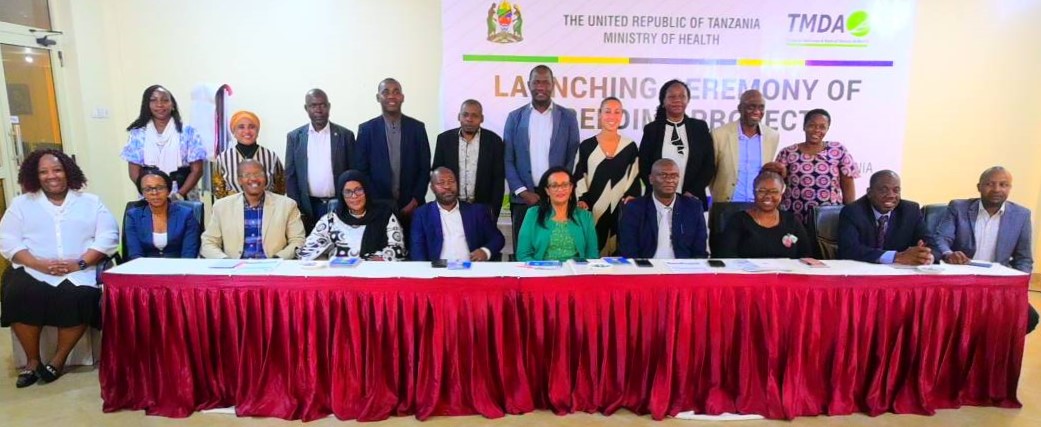BREEDIME project launches in Dar es Salaam

On 4 August, Principal Research Fellow Dr Wilber Sabiiti attended the launch of the BREEDIME project in Dar es Salaam, Tanzania. As a project partner, the University will support work on training, in vitro diagnostics capacity-building and health data management for BREEDIME (“Building resilient research ethics, diagnostics and medicines regulatory capacity during routine and public health emergency periods”). The project was prompted in part by the region’s struggle to cope with the impact of recent COVID-19 pandemic.
Funded by the European Commission’s Global Health EDCTP3 Joint Undertaking, the initiative builds on the work of SMERT and ASCEND, in which the University was also closely involved. Supported by the previous EDCTP programme (EDCTP2), both projects focused on capacity-building in the areas of research ethics and medicine regulation. This has led to the creation of electronic systems for submitting and reviewing research ethics applications and for reporting serious adverse events during clinical trials. The projects have also prompted the development of a bioethics curriculum for use in both university and continuing professional development courses. These capabilities have helped reduce the research protocol review process timeline from a minimum six months to mere weeks in some cases.
Expanding on the capacities built by SMERT and ASCEND, BREEDIME will focus on equipping Tanzania (mainland), Zanzibar and Rwanda to effectively prepare for and respond to public-health emergencies. The project will be coordinated by Sweden’s Karolinska Institute (KI), which joined the project as its European partner following the United Kingdom’s departure from the EU in 2020. Tanzania Medicines and Devices Authority (TMDA) will serve as the scientific lead. Other partners include National Institute for Medical Research (NIMR, Health Research Data Capacity-Building Lead), Kilimanjaro Clinical Research Institute (KCRI, Communication & Dissemination Lead), Muhimbili University of Health and Allied Sciences (MUHAS, Training Lead), Zanzibar Food and Drug Agency (ZFDA, Post Market Surveillance & Appraisal Lead), the Zanzibar Health Research Institute (ZAHRI, Research Ethics Capacity-Building Lead), and the Rwanda Food and Drug Authority (Rwanda FDA, Therapeutics & Vaccines Lead).
Reflecting on the launch of the project, Dr Sabiiti said, “the lessons from BREEDIME should be scaled up to East African Community level to build a research and medicines regulatory landscape that covers the whole region.”
Image Details:
Front row (R-L): Dr Ndekya Oriyo (Principal Research Scientist, NIMR), Dr Mary Miyige (Director, Information & Communication Technology, NIMR), Prof Eliangiringa Kaale (Professor of Medicine Quality Assurance and Regulatory Affairs, MUHAS), Dr Mayassa Ally (Director, ZAHRI), Dr Wilber Sabiiti (Principal Research Fellow, University of St Andrews), Prof. Eleni Aklillu (Professor of Tropical Pharmacology & Research Group Leader, KI), Dr Adam Mitangu Fimbo (Director General, TMDA), Prof Blandina Mmbaga (Director, KCRI), Dr Burhani Simai (Director, ZFDA), and Mr Damas Matiko (Manager, Clinical Trials Control and Pharmacovigilance, TMDA).
Back row (R-L): Dr Ruby Mcharo (Coordinator, National Health Research Ethics Committee, NIMR), Dr Hadija Semvua (Research Project Coordinator, KCRI), Mr Bernard Mtuta (ZAHRI), Dr Ame Msemo (TMDA), Mr Khamis Kheir (ZAHRI), Mr Emmanuel Masunga Gedi (TMDA), Ms Sonia Hammi (Administrative Officer, KI), Dr Kissa Mwamwitwa (Director, Devices, TMDA), Mr Bora Lichanda (Pharmacist, ZFDA), and Dr Vicky Manyanga (Senior Lecturer in Medicinal and Pharmaceutical Chemistry, MUHAS).